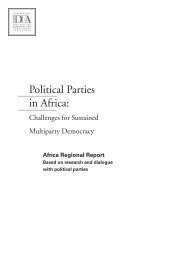Background Document - Danish Institute for Parties and Democracy
Background Document - Danish Institute for Parties and Democracy
Background Document - Danish Institute for Parties and Democracy
You also want an ePaper? Increase the reach of your titles
YUMPU automatically turns print PDFs into web optimized ePapers that Google loves.
In fact training <strong>and</strong> capacity building are seen as crucial interventions that would<br />
provide an enabling environment <strong>for</strong> women to enter <strong>and</strong> assume leadership in local<br />
politics.<br />
In the e-discussion conducted by iKNOWPolitics in 2009 on women in local politics,<br />
women from Burkina <strong>and</strong> Ivory Coast including an aspirant from the latter wrote<br />
in about the importance of support <strong>and</strong> capacity building <strong>for</strong> women to enter local<br />
politics. The aspirant from Ivory Coast wrote:<br />
“Women are not enough confident they are not prepared <strong>for</strong> the job. Many of<br />
them refuse to run <strong>for</strong> election. In order to increase women number in election at<br />
the local level the following measure are required: Strengthen women ability to do<br />
politics; promote best practices in local governance; promote women c<strong>and</strong>idacy<br />
thanks to coaching <strong>and</strong> experience sharing; <strong>and</strong> the rein<strong>for</strong>cement of women’s<br />
leadership.”<br />
Women are also more likely to participate in devolved systems of local governments<br />
which have more autonomy, financial freedom, hold regular elections <strong>and</strong> are<br />
generally more open to change rather than ones strictly controlled by the central government.<br />
In fact decentralisation is seen as a key to women’s participation in local<br />
level politics.<br />
Contributors from Senegal <strong>and</strong> Mali made this point in the e-discussions on women<br />
in local governance in August 2009.<br />
For instance Fatou Diop from Senegal made the case <strong>for</strong> decentralization as a key<br />
tenet in improving local governance mechanisms by making them accessible to women.<br />
“The decentralization process is one of the main measures undertaken <strong>for</strong> improving<br />
local governance. In order to have solid local institutions, more women involvement<br />
is required. In villages <strong>and</strong> small towns, women are doing all the work<br />
<strong>and</strong> they are also the first victims. In order to increase the number of women in<br />
local governance quota is required in the case of Senegal.”<br />
Mariam Diallo makes the point that decentralization can also result in enhancing<br />
the capacity of local communities through knowledge transfer:<br />
“In Mali we have 8 regions, 40 circles, <strong>and</strong> 287 administrative districts. There is<br />
three level of decentralized authority: Regions are divided into circles, circles into<br />
commune <strong>and</strong> communes into quarters. The main goal of the decentralization process<br />
is to share the central power with the local entities. Not only will the power be<br />
conveying but also the skills <strong>and</strong> knowledge <strong>for</strong> an effective decentralization.”<br />
A proportional representation system can result in more women being elected<br />
<strong>and</strong> there also appears to be some evidence that local elections based on the ward system<br />
create more visibility <strong>for</strong> women, <strong>and</strong> give them a better chance to win elections<br />
as well as keeping campaign costs low.<br />
Introduction of quota systems <strong>for</strong> women in local government in some parts of<br />
the world such including South Asia has resulted in significant increases in the number<br />
of women being elected <strong>and</strong> employed. However the discussion around the quota<br />
system may need to be qualified a little further.<br />
The summary of the e-discussions on women in local governments in 2009 cites<br />
the example of Jordan as a case in point where the use of quotas in 2007 led to over<br />
300 women being elected as municipal council members. At the time of the discussion<br />
in 2009, some 35 countries had quotas at the constitutional level or legislative<br />
quotas at the subnational level, quotas at the party level <strong>for</strong> electoral c<strong>and</strong>idates (pro-<br />
WOMEN IN POLITICS DANISH INSTITUTE FOR PARTIES AND DEMOCRACY PAGE 27
















